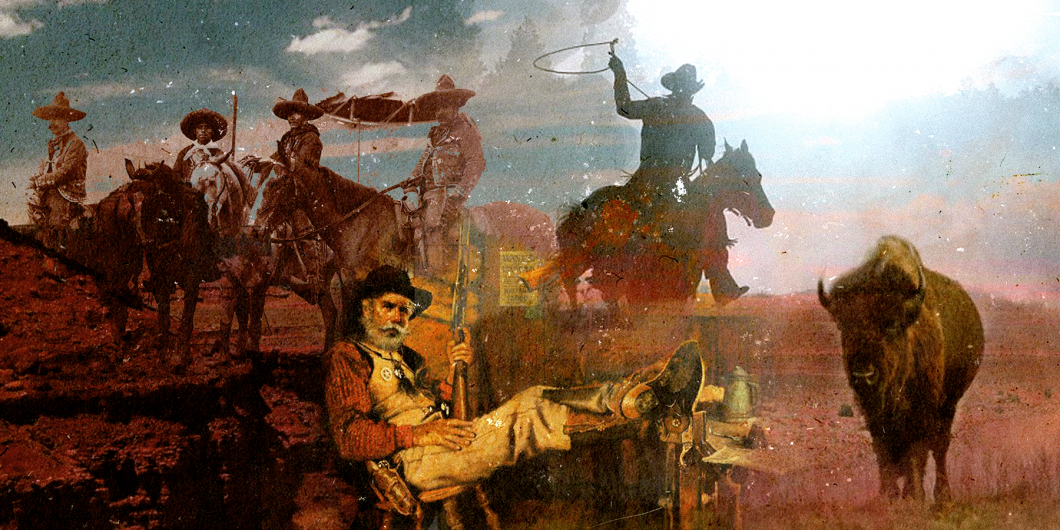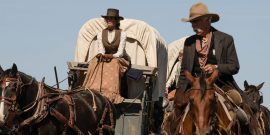With 1883, Taylor Sheridan is giving America back what it loved about the Western.
Law on the Range
The western is a deeply American genre, full of themes intimately bound up with American history and Americans’ images of ourselves. It has fallen on hard times in recent years, partly because westerns often center around narratives that are now thought of as politically incorrect. This makes it all the more exciting that the Library of America has published a single-volume collection of four classic westerns: Walter Van Tillburg Clark’s The Ox-Bow Incident (1940), Jack Schaefer’s Shane (1949), Alan Le May’s The Searchers (1954), and Oakley Hall’s Warlock (1958). All were made into films (also terrific), but the novels are more complex and nuanced. They are also a pleasure to read, although the historically accurate renderings of the language of the frontier may soon render them vulnerable to cancellation.
The novels are at least loosely based on real events, although all portray the West as far more violent and less ‘lawful’ than it was. An invaluable source on the history of the West is Terry L. Anderson and P.J. Hill’s The Not So, Wild, Wild West (Stanford 2004). The novels’ focus on atypical events helps provoke us to think about the role of law in a free society. Their settings share the absence of the formal rule of law, and the struggle of communities’ and individuals’ to establish law to protect their lives, families, and property.
The Stories
Considerations of space prevent conveying the richness of the narratives in the four novels. Reduced to the essentials and forswearing all attempt at nuance, the four stories share some key elements. Here are the bare bones:
Ox-Bow: A community organizes a vigilance committee in response to a report of a murder despite pleas from several residents that the proper course of action is to send for the sheriff. The pleas are rejected, both on the grounds the sheriff will arrive too late as the murderers have a head start and that the legal system’s “kind of justice” is what let rustlers and murderers “into this valley.” The committee catches the alleged rustlers, hangs them, and then discovers there was no murder and that the alibi provided by the rustlers was true.
Warlock: A community organizes a “Citizens Committee” in response to a murder, which, despite doubts by some members, sends for Blaisedell, a gunfighter, to serve as “Marshal,” a position of no legal status. The formal legal system is inactive: the county sheriff views the town as beyond his jurisdiction (he’s simply lazy), and the law is executed under the purview of a literally insane military governor, “General Peach” who devotes his efforts to capturing a (possibly imaginary) Mexican bandit. The Marshal brings some order, but killings continue, and his position becomes ever more legally and morally precarious. The General eventually invades the town in order to crush a miners’ strike rather than to execute the law. The General assaults the Marshal, beating him senseless and then abandoning the town in pursuit of his bandit. After a final shootout in which he kills a gambler who is his friend, the Marshal leaves town and vanishes into myth. The town briefly prospers but declines when the mines become depleted.
Shane: A mysterious stranger arrives in a community just as conflict breaks into the open between homesteaders and free-range cattlemen, led by Luke Fletcher. When the main cattleman imports Stark Wilson, a hired gun, the homesteaders are forced to choose between an open fight and giving up their claims. The mysterious stranger and title character “Shane” steps forward, sacrificing his own hard-won peace of mind, and kills Wilson and Fletcher, then rides off.
The Searchers: A family is murdered by Comanches, who kidnap the young daughter, Debbie. Her uncle Amos and Mart, a young man who had lived with the murdered family after his own parents were killed by Comanches, set out to find the kidnapped girl. Amos’ motive is revenge, Mart’s is the recovery of the young girl. Their search takes years and brings them into conflict with the formal legal system, whose representatives are uninterested in helping find the girl. As their search finally bears fruit, they are arrested by the Texas Rangers, who fear their actions are stirring up the Comanches. They escape and locate the missing girl. They attack the Comanche camp in an effort to rescue her. Amos is killed, Mart rescues the girl, who is initially unwilling to consider returning to white society but who finally remembers the strong bond between them.
Bringing Order
A common theme to all four novels is the need for creating order on the frontier. In each, the formal law and institutions of the state are distant and unavailable, although in Ox-Bow the sheriff is not that far away. In each story, the community provides its own law. In two cases, this ends badly. Ox-Bow closes with the narrator’s desire to leave the community in what the novel suggests is a likely fruitless effort to forget his role in hanging three innocent men; Warlock’s characters have all suffered considerable losses as a result of bringing Blaisedell to town and the town quickly fades away, leaving only the burnt out shell of its courthouse standing.
Private efforts at ordering communal life are more successful in Shane and The Searchers. In Shane it is the cattlemen, not the community, who first resorts to extra-legal violence, and Shane’s departure after his victory over the hired gunman and the rancher is his sacrifice for the community, a recognition that the violence he represents cannot stay in the civilization his efforts made possible. In The Searchers, Mart’s triumph over both the formal legal system’s indifference and Amos’ desire for revenge is a victory for love. Whatever the future holds for Mart and Debbie afterwards, the reader is given the sense that they will be alright.
When the law fails
The law fails in Warlock, Shane, and The Searchers; only in Ox-Bow can we see alternative paths by which the law could have been successfully invoked and only in that book are the representatives of the law portrayed as anything less than failures. In Warlock, the chief authority is the literally insane General Peach, who lives in his own reality obsessed the perhaps mythical Mexican bandit. The country sheriff is a day’s ride away but refuses to do more than appoint a helpless deputy for Warlock, explicitly telling the citizens that the town is too far away for him to concern himself with. The voice of the law is a disreputable “judge,” who has no official status, who is never depicted without his whiskey bottle, and who is sleeping off a bender when the fateful decision to send for Blaisedell is taken and therefore unable to even attempt to stop the Citizens Committee (of which he is a member). In Shane, the homesteaders at first want to wait out the attacks on them by the cattlemen, in hopes that their growing numbers will lead to the establishment of a local sheriff, who will be responsive to the more numerous homesteader-voters rather than to the cattlemen. In The Searchers, the Rangers show no interest in Debbie’s fate or the men Amos and Mart kill when the two are ambushed. They only become involved once the searchers’ activities threaten to stir up trouble with the Comanches.
The failure of the rule of law is most dramatic in Warlock. When the army finally comes to Warlock, albeit for the illegitimate purpose of chasing the striking miners out of town to help the mine owner crush the strike, Blaisedell takes a stand in front of the boarding house (ironically named for the General), protecting some sick miners within. At first, he appears successful in persuading the soldiers surrounding the building to go away. Then the General suddenly assaults Blaisedell, beating him furiously with a stick, marking his face with welts and knocking him to the ground, roaring “I am! I am!” The troops enter the hotel and seize the wanted men. Just as the mine owner’s victory appears complete, the General suddenly receives word that the quasi-mythical Mexican bandit has been sighted. The army charges off, allowing the miners to be escape. The General dies while leading the pursuit, in ambiguous circumstances. The rule of law collapses as a result of his unhinged and unfinished quest.
Even more than Ox-Bow, Warlock forces the reader to wrestle with the problem of establishing law. Thwarted at every turn in their efforts to get help from the county, territory, or Washington, and with the law embodied by an insane man who can provide no better justification than to roar “I am!”, the novel lacks the easy answers available in Ox-Bow. The citizens of Warlock have been waiting. What else can they do but send for Blaisedell when something as trivial as a nick while shaving leads to murder? As one man tells the judge, “The law is the law! But there isn’t enough of it to go around out here.” And, as revealed by the letter to a grandson studying at Yale by one character (the novel’s closing), when the historical record grows hazy, our understanding the lessons of events fragments.
These four novels enable us to think through how we would act when the formal legal system is absent or fails, as it does in each of these stories.
Protecting property
Although Shane has the clearest focus on issues of property rights (homesteaders vs cattlemen), all four novels involve conflicting property claims. The alleged rustlers in Ox-Bow are disbelieved in their claim that they have the cattle with them legitimately because they lack a bill of sale (although they have an explanation for this). Cattle rustling also features in Warlock, with the primary villain’s business of rustling cattle south of the border suspected to include rustling from neighbors as well. And cattle rustling is not the only threat to property: rson and property damage are part of the rivalry between the town’s two saloon owners. The Comanche raids that start The Searchers are also conflicts over property —the homesteaders have taken Comanche lands.
Much like the homesteaders and citizens in the other novels, the homesteaders in Shane need the protection of law against Fletcher’s (the cattleman from Shane) growing threat to their property. Unlike Warlock, the failure of the law is not the result of the imperfections of the men charged with providing it (laziness, insanity, drunkenness) but merely of time and distance. If they are to have law, they will have to—at least for now—defend their rights themselves. Unlike Warlock and Ox-Bow, the homesteaders in Shane have a strong moral claim to protection. In the absence of state institutions strong enough to restrain the cattlemen, the state’s responsibility falls to Shane. Significantly, Shane must sacrifice himself by giving up the peace he has found working for Starrett. As with Blaisedell, Shane must then leave civilization, for once law has come, there is no room for outlaws. The violence of outlaw characters can establish law, but remains incapable of following it.
The Usefulness of Novels as Models
The economist Tyler Cowen suggests that novels can be treated like models to help us understand the world. They can serve as what Cowen calls a calibration, asking readers to judge the validity of the author’s underlying model of human behavior and institutions through the data provided by the characters’ choices. These four novels serve that purpose well by enabling us to think through how we would act when the formal legal system is absent or fails, as it does in each of these stories. There are dangers in acting too hastily (Ox-Bow) or for the wrong motive (Searchers). Using force to solve a problem risks both the enforcer we turn to (Shane) and the soul of the community (Warlock). None of these books offer easy answers, which is why they are still worth reading more than half a century after they were written. All of them will provoke the reader to think, which is why we should be glad the Library of America has combined them into this excellent edition.



